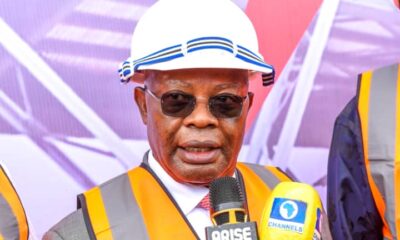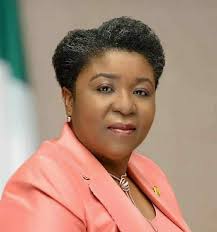Editorial
Hurray, Rivers Is 57!
Continued from Page 1
The 12 States were North-Western State, North-Eastern State, Kano State, North-Central State, Benue-Plateau State, Kwara State, Western State, Lagos State, Mid-Western State, Rivers State, South-Eastern State, and East-Central State. However, these twelve states have since metamorphosed into thirty-six federated units, giving new and more fundamental relevance to Gowon’s definitive action.
Gowon’s desire to strengthen national unity and prevent more instability led him to seek support for the states’ creation exercise from an extensive cross-section of regional leaders before declaring the enacted order. In the Eastern Region, the whimper for the creation of the Calabar – Ogoja – Rivers (COR) State had risen increasingly vocal. In the North, the Middle Belt movement became a major source of dissatisfaction in the region.
The battle, agitations, and creation of Old Rivers State, now Bayelsa and Rivers, commenced in 1939 and climaxed in 1967. The state as constituted then was under the Eastern group of provinces in 1939 with administrative headquarters in Enugu. The group of provinces later became the Eastern Region of Nigeria, made up of Igbos, as the dominant ethnic nationality with other minorities comprising the region. The minorities included the Ijaw, Ibibio, Efik, Anang, Ogoja, Ikwerre, Ibani, Ekpeye, Engenni, Ogba, Kalabari, Nembe, and Ogoni, among others.
Rivers State in the Niger Delta region is unique. Popularly known as the Treasure Base of the Nation, the State’s uniqueness is not random. The abundance of human and natural resources coupled with its people’s hospitality, makes the State stand shoulder-high among its contemporaries. Gowon’s proclamation of a distinct state was, indeed, a realisation of the vision of the founding fathers. These fathers over several decades, bemoaned the marginalisation by prominent ethnic groups in the Nigerian project. This was particularly the Igbos, who cohabited the then Eastern Region with its capital in Enugu.
Starting with its first Military Governor, Navy Commander Alfred Papapriye Diete-Spiff in 1967 to the present administration of Governor Siminalayi Fubara, successive administrations, both military and civilian alike, have made significant contributions to making the state the enviable one it is today. From the creation of Bayelsa State in 1996 to the exponential growth in the education sector, human capital development, infrastructural revolution, health sector development, national political relevance, active participation in the global economic renaissance and bold presence on the world entertainment stage, Rivers State can indeed be said to have come of age.
Perhaps except for the epoch of the pioneer administration, at no other time in history has the state experienced such a level of transformation of its landscape as is being realised under the present administration. From an extensive urban regeneration effort that has seen the rebuilding of state-owned assets and city roads to meet present-day needs and the building of vast road infrastructure in all parts of the state, the current administration is truly working hard to realise the objectives of the state’s founding fathers.
By the efforts of the state government, Andoni and some adjoining communities have been made accessible to the state capital by road. The same fortune is soon to be enjoyed by erstwhile disconnected people of the Kalabari Kingdom through the commencement of the second phase of the Trans-Kalabari Road. By the same token, a courageous move has been initiated to create more urban centres in the state. This is done through the siting of essential projects.
The political class in the state, in particular, must utilise this event of the 57th Anniversary of the state’s creation to evaluate and determine to eschew bitterness, rancour and acrimony and work with the Fubara-led administration. The struggle for Rivers State achieved the desired results because the political elite, traditional rulers and the youth of the time shared a rare and uncommon sense of oneness, purpose, selflessness and indeed drive for service to the fatherland.
That widely acclaimed Rivers’ spirit of love and commitment to selfless service have waned greatly, leaving in their stead, a threat to public peace activated by political greed, selfishness and an unguided quest for personal aggrandisement far and above love for the state. The clarion call is, therefore, for leaders at all strata to introspect and purge themselves of all tendencies that are inimical to the overall development and prosperity of the state.
We must remind ourselves, especially the political class, that it took selfless sacrifices, personal denials and unrelenting activism from foundational leaders. This was achieved for us in the state we now call home. All must embrace peace, tolerance, and true brotherliness and seek civil and lawful means to address all grievances and disagreements. This is because strife, violent confrontations and aggressive engagements will only destroy the time-enduring bonds of togetherness that have bound our people for years.
The founding fathers’ relentless struggle to question the imbalance and injustice of the Nigerian Federation remains the philosophy behind the state’s creation. Their mission and vision was to ensure Rivers State’s pride of place in Nigeria. The question remains, however, whether that vision has been achieved or not. More than any other time in our history, the need to re-enact and revive the values, sentiments, philosophies, and spirit that formed the driving force of the founding fathers to victory is now.
The Tide extends its heartfelt congratulations to the esteemed government and people of Rivers State on the auspicious occasion of the 57th Anniversary of the state’s creation. All stakeholders must rally together to pursue the common goal of ensuring that the state remains a safe haven, where security, peace, prosperity, and unimpeded opportunities for happiness reign supreme for all its inhabitants and the business community.
Today also holds a special importance not only as the day we celebrate the birth of our dear state, but also the day we honour our precious children, known as Children’s Day. This occasion is dedicated to celebrating the innocence, joy, and dreams of our little ones. It is a time to reflect on the necessity of nurturing, protecting, and investing in their future well-being.
Children are the future of our society, and on this special day, we acknowledge their unique contributions and remind ourselves of their inherent rights and needs. It is an opportunity to recommit to creating a world where every child has access to quality education, healthcare, and a safe and loving environment. By celebrating Children’s Day, we not only honour our children but also invest in the future of our nation and the world.
The event serves as a reminder that children are not just miniature adults but individuals with their own thoughts, feelings and perspectives. It is essential to listen to their voices, respect their opinions, and provide them with the support and guidance they need to thrive. When we empower our children, we equip the future generation to become responsible, compassionate, and active citizens who will shape the country for the better.
Editorial
Democracy Day: So Far…

Nigeria’s return to democratic rule in 1999 marked a watershed moment in the nation’s political history. After enduring nearly 16 years of successive military dictatorships, Nigerians embraced a new era of civil governance with the inauguration of President Olusegun Obasanjo on May 29, 1999. Since then, the country has sustained a democratic system for 26 years. But, this democratic journey has been a complex mix of progress and persistent challenges.
The formal recognition of June 12 as Democracy Day in 2018 by former President Muhammadu Buhari acknowledged a long-standing injustice. The annulment of the 1993 presidential election, Nigeria’s freest, betrayed the democratic aspirations of millions. That it took decades to honour this date reflects the nation’s complex relationship with its democratic memory.
One of the most momentous successes of Nigeria’s democracy has been the uninterrupted civilian rule over the last two and a half decades. The country has witnessed seven general elections, with power transferring peacefully among different political parties. This is particularly notable considering that prior to 1999, no civilian government had completed a full term without military intervention. The peaceful transitions in 2007, 2015, and 2023 are testaments to Nigeria’s evolving democratic maturity.
Electoral participation, while uneven, has also reflected a level of democratic engagement. In 2003, voter turnout stood at about 69 per cent, but this figure dropped to approximately 34.75 per cent in 2023, according to the Independent National Electoral Commission (INEC). Although the declining turnout raises concerns, it also highlights the increasing expectations of the electorate, who demand credible and transparent elections.
Another area of progress is the growth of a vibrant and free press. Nigerian media has played a crucial role in holding governments accountable and fostering public discourse. Investigative journalism and civil society activism have exposed corruption and human rights abuses. The rise of social media has further expanded the democratic space, enabling young Nigerians to mobilise and advocate for change, as evidenced by the 2020 #EndSARS protests.
Judicial independence has seen mixed results. On one hand, the judiciary has occasionally demonstrated resilience, such as in landmark rulings that overturned fraudulent elections or curtailed executive excesses. On the other hand, allegations of political interference and corruption within the judiciary persist, undermining public confidence in the legal system’s impartiality.
Nigeria’s democracy has also facilitated the decentralisation of power through the federal system. State governments now wield some autonomy, allowing for experimentation in governance and service delivery. While this has led to innovative policies in some states, it has also entrenched patronage networks and uneven development across the federation.
Despite these successes, Nigeria’s democratic journey faces formidable problems. Electoral integrity remains a critical concern. Reports from election observers, including those from the European Union and ECOWAS, frequently highlight issues such as vote-buying, ballot box snatching, and violence. The introduction of the Bimodal Voter Accreditation System (BVAS) and electronic transmission of results in 2023 elections showed promise, but technical glitches and alleged manipulations dampened public trust.
Corruption continues to be a pervasive issue. Nigeria ranks 145th out of 180 countries on Transparency International’s 2023 Corruption Perceptions Index, with a score of 25/100. Democratic institutions meant to check graft—such as anti-corruption agencies and the legislature—often struggle due to political interference and weak enforcement mechanisms.
Security challenges have also strained Nigeria’s democracy. Insurgency in the North East, banditry in the North West, separatist agitations in the South East, and herder-farmer conflicts across the Middle Belt have collectively resulted in thousands of deaths and displacements. According to the Global Terrorism Index 2024, Nigeria ranks as the eighth most impacted country by terrorism. The government’s difficulty in ensuring safety erodes public confidence in the state’s capacity and legitimacy.
The economy poses another critical remonstrance. Nigeria’s Gross Domestic Product (GDP) per capita stands at approximately $2,400 as of 2024, with over 40 per cent of the population living below the national poverty line. High unemployment and inflation have fueled discontent and disillusionment with democratic governance, especially among youth. Without addressing economic grievances, the democratic dividend will remain elusive for many Nigerians.
Ethnic and religious divisions further complicate Nigeria’s democratic consolidation. Politicians often exploit identity politics for electoral gains, exacerbating social tensions. Although federal character principles aim to promote inclusiveness, they have also sometimes fostered a quota mentality rather than merit-based appointments.
Gender representation remains inadequate in Nigeria’s democratic institutions. Women occupy less than 10 per cent of seats in the National Assembly, one of the lowest rates globally. Efforts to pass gender parity bills have faced stiff resistance, highlighting deep-seated cultural and institutional barriers to female political participation.
Civil liberties, while constitutionally guaranteed, are under threat. Crackdowns on protesters, restrictions on press freedom, and surveillance of activists reveal an authoritarian streak within the democratic framework. The controversial Twitter ban in 2021 exemplified the country’s willingness to curb digital freedoms, prompting domestic and international criticism.
The political crisis in Rivers State embodies broader democratic struggles. Attempts to control the state through undemocratic means expose weaknesses in federal institutions and the rule of law. Immediate restoration of democratic governance in Rivers State is vital to preserving Nigeria’s democratic integrity and institutional credibility.
Local governments remain under the control of state governors, depriving citizens of grassroots democracy. Last year’s Supreme Court judgment on local government autonomy is promising, but state-level resistance threatens its implementation. Genuine autonomy would bring governance closer to the people and foster democratic innovation.
As we mark Democracy Day, we must honour the sacrifices of Chief M.K.O. Abiola, Kudirat Abiola, Femi Falana, Chief Gani Fawehinmi, Pa Alfred Rewane, President Bola Tinubu, and countless others, who fought for Nigeria’s freedom. As democracy in Nigeria continues to evolve after 26 years, this day should inspire action toward its renewal. With despotism and state failure as real threats, both citizens and leaders must take responsibility—citizens by demanding more, and leaders by delivering. Excuses are no longer acceptable.
Editorial
Nigeria’s Plastic Pollution Emergency

Yesterday, Nigeria joined the rest of the world to mark 2025 World Environment Day. The occasion serves as a stark reminder that our battle against plastic pollution requires more than symbolic gestures—it demands sustained, coordinated action from all levels of government. As communities worldwide grapple with mounting environmental challenges, Nigeria’s approach to plastic waste management stands at a critical juncture.
Dr. Ibinabo Ogolo, a Research Fellow at the Institute of Geosciences and Environmental Management at Rivers State University, has issued a timely call for comprehensive enlightenment campaigns targeting indiscriminate plastic waste disposal. Her message resonates with the urgency that characterises this year’s global theme: “Beat Plastic Pollution.”
The core challenge lies not in policy formulation but in implementation. Years of environmental initiatives have fallen short primarily due to inadequate public education and awareness campaigns. Citizens cannot be expected to adopt responsible waste disposal practices without understanding the gravity of their actions or knowing the proper alternatives.
Government platforms at federal, state, and local levels possess the infrastructure necessary to reach every corner of our society. Television, radio, social media, community meetings, and educational institutions provide ready channels for sustained messaging. The tools exist; what remains is the political will to deploy them effectively and consistently.
This year’s World Environment Day theme underscores the global recognition of plastic pollution’s devastating impact on ecosystems, wildlife, and human health. The message is clear: plastic waste represents one of the most pressing environmental challenges of our time, requiring immediate and sustained attention from policymakers and citizens alike.
The health implications of plastic pollution extend far beyond environmental aesthetics. Industrial and medical plastic wastes often contain toxic chemicals with carcinogenic properties, posing direct threats to human health. These materials don’t simply disappear when improperly disposed of-they infiltrate our environment, contaminating soil, water sources, and food chains.
Plastic additives released into the environment create a cascade of contamination that affects entire ecosystems. Wildlife suffers through ingestion, entanglement, and habitat destruction, while humans face exposure through contaminated water, food, and air. The interconnected nature of these impacts demands a comprehensive response that addresses both immediate disposal practices and long-term prevention strategies.
The link between plastic pollution and serious health conditions, including breast, ovarian, liver, and lung cancers, as well as various hormonal disorders, underscores the urgency of public education campaigns. Citizens have the right to understand how their daily choices affect not only environmental health but their own well-being and that of their families.
Despite scientific awareness of ocean plastic pollution dating back approximately 50 years, Nigeria’s rivers, creeks, and waterways continue to suffer from plastic waste invasion. This represents a failure of sustained commitment rather than a lack of knowledge about the problem’s existence and solutions.
The ritualistic approach to World Environment Day celebrations must end. Annual speeches and symbolic cleanups, while valuable, cannot substitute for year-round, systematic efforts to change behaviour and protect our environment. Governments must develop comprehensive frameworks that extend beyond June 5th commemorations.
Sustained enlightenment campaigns require dedicated funding, clear messaging, measurable objectives, and regular evaluation. Success depends on consistency, creativity, and community engagement that transforms environmental protection from a government mandate into a shared cultural value.
The path forward demands that all stakeholders-government officials, community leaders, educators, and citizens-recognize their roles in combating plastic pollution. Only through sustained, coordinated efforts can we hope to achieve the behavioural changes necessary to protect our environment and secure a healthier future for generations to come.
Editorial
2025 UTME: Lessons, Concerns

The recent uproar surrounding the poor performance of students in the 2025 Unified Tertiary Matriculation Examination (UTME), alongside growing distrust in the Joint Admissions and Matriculation Board (JAMB), has sparked nationwide concern and regional tensions.
JAMB’s published results reveal a troubling trend: over 75 per cent of candidates scored below 200 out of 400. This marks a continuation of a steady decline in performance since 2020. The Minister of Education, Prof. Tunji Alausa, attributed this decline largely to the shift toward the Computer-Based Test (CBT) format introduced by JAMB.
Yet the crisis extends beyond widespread low scores. A total of 379,997 candidates-primarily from South-East Nigeria and Lagos State-were reportedly affected by technical glitches and human errors. These issues rendered their results invalid. In a rare public admission, JAMB Registrar, Professor Ishaq Oloyede, broke down in tears at a press conference, accepted responsibility, and announced a makeup UTME scheduled from Friday, May 16 to Monday, May 19, 2025.
However, the decision to reschedule the exam on short notice has drawn criticism. Many argue that the affected candidates, already emotionally distressed, were not given sufficient time to prepare. The Board’s plan to inform them via bulk SMS-a method known for its 50-60 per cent delivery rate-was also seen as inadequate, potentially excluding half of those impacted. Critics argue, JAMB should have either extended the resit period or leveraged digital answer scripts for regrading-unless, of course, such retrieval technology is unavailable.
Multiple factors likely contribute to the consistent underperformance of UTME candidates, yet the nation has seemingly accepted this dismal trend as standard. Each year, JAMB meets with university vice-chancellors, and low results are normalised. Consequently, universities scramble to admit the 25 per cent who scored above 200, often lowering their standards to fill quotas. This is especially evident in the profit-driven expansion of private universities.
The 2025 UTME debacle has exposed long-standing systemic flaws. Embracing digital-only exams demands greater readiness-both from service providers and from candidates. Reports from CBT centres include system malfunctions, frozen screens, login errors, and lost answers. Some candidates were unable to navigate subjects or submit their tests. These failures were beyond their control.
Whether due to technical incompetence or deliberate sabotage, the damage is clear. Some speculate that JAMB or its leadership-particularly Prof. Oloyede-may have been targeted. Over the past nine years, Oloyede has returned billions of naira in surpluses to the national treasury, earning both praise and scrutiny. While JAMB is not a revenue-generating agency, this unusual financial transparency has boosted its public image.
Despite this crisis, Prof. Oloyede showed commendable leadership, accepting responsibility, and taking immediate corrective action. The priority now must be to implement lasting solutions that prevent future failures. Leadership must be both principled and responsive to the public outcry.
Beyond the technical breakdowns and poor performance statistics, the UTME crisis had a tragic human cost, with at least one student reportedly taking their own life. Widespread irregularities have undermined trust in Nigeria’s educational meritocracy, reducing years of student effort to nothing.
The use of flawed software systems lacking safeguards has had catastrophic consequences. Essential reforms must include external audits, system redundancies, and real-time monitoring. JAMB’s initial poor communication only deepened public anxiety, underlining the need for greater transparency and independent oversight.
What is required now is a complete overhaul of JAMB’s technical infrastructure and a new communication strategy grounded in empathy and student welfare. Broader systemic reforms must follow, including more inclusive admission criteria and better support structures for students.
This crisis presents an opportunity-a solemn one-for sweeping reforms that centre students’ needs. Transformative action must be taken, not just in response to this scandal, but in honour of the life lost and to restore public trust.
Finally, an urgent and impartial investigation must uncover the true causes of these failures. Those found culpable must be held accountable. If we move forward without consequences, both JAMB’s reputation and that of its leadership may suffer irreparable damage.
-
Rivers5 days ago
Rivers SOLAD Urges Traditional Rulers To Protect Govt Facilities
-

 News4 days ago
News4 days agoIbas Presents ?1.48trn Rivers 2025 Budget To Reps, Laments Sabotage
-
Niger Delta5 days ago
PIA: Bayelsa Engages Oil Firms, Dev Trusts On Transparency …Set To Issue New Operation Guidelines
-

 News4 days ago
News4 days agoFG Working Towards World-Class Public Service -Walson-Jack
-
Rivers5 days ago
450 Varsity Admins Undergo Specialised Training On Nigeria’s Higher Education
-

 Sports4 days ago
Sports4 days agoTeam USA Booed After Another Whipping
-
Politics5 days ago
Ex-Minister Cautions Eno Against Forcing Lawmakers To Join APC
-

 News4 days ago
News4 days agoKing Daukoru commends Tinubu for prioritising welfare of oil communities

